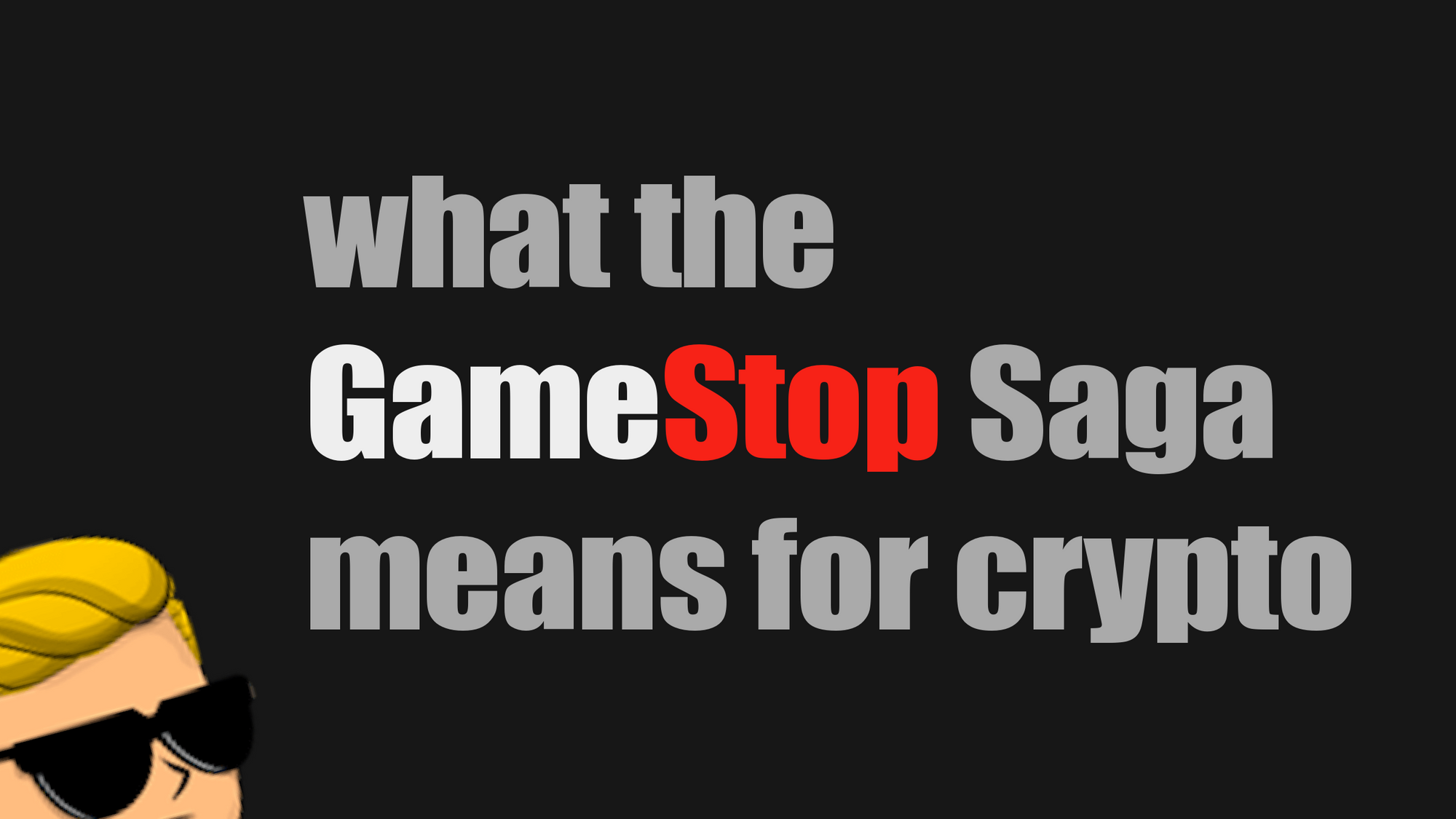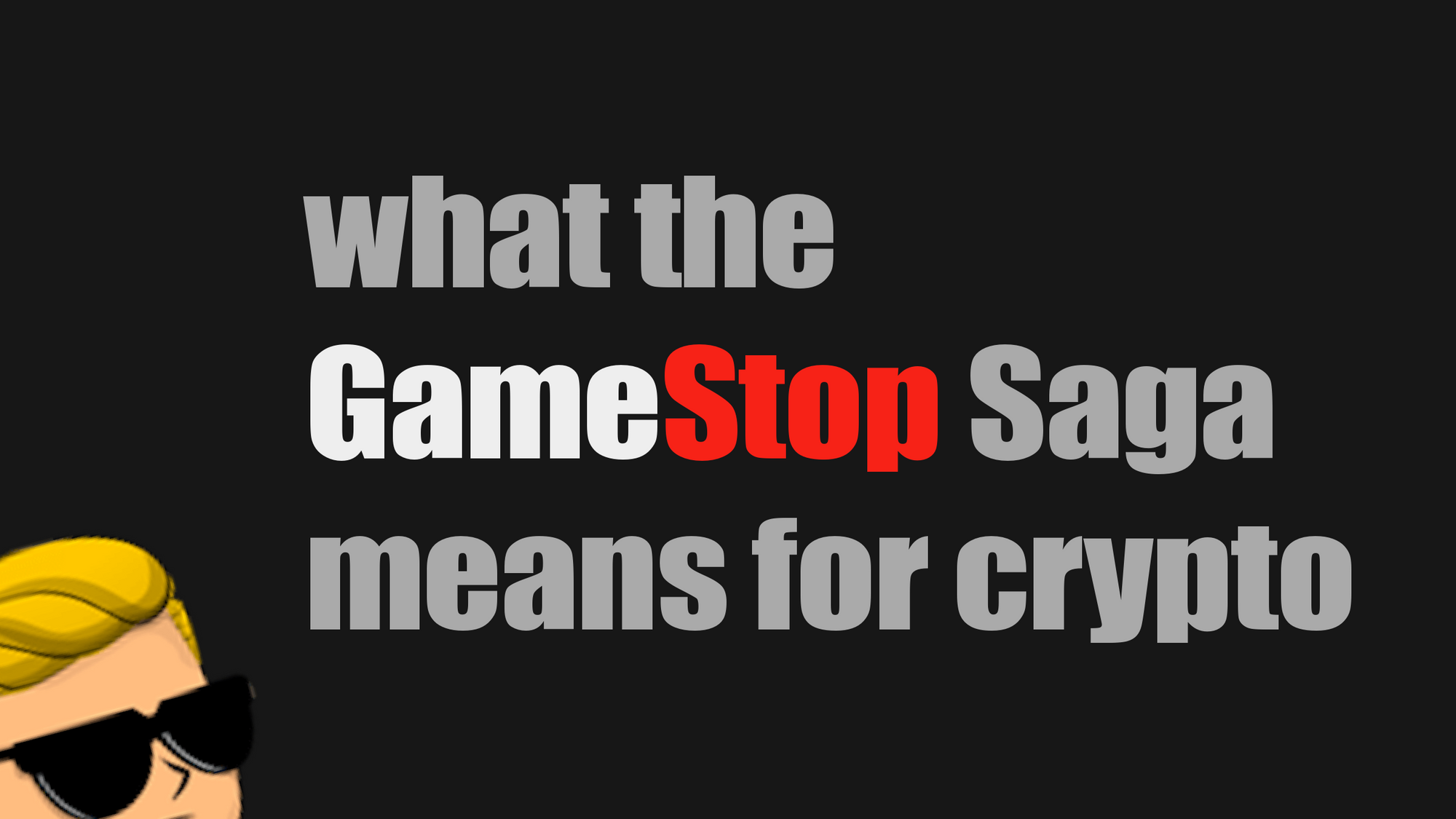[Coinlist] What the GameStop Saga Means for Crypto


Over the past ten days, the attention of the business world has been hijacked by an army of small-time retail investors that took on, and beat, traditional hedge funds at their own game.
GameStop, the sleepy video game retailer that suffered decreasing revenue and store closures in 2020, started the year at $18.84/share. Last Thursday, GameStop traded at $470, up almost 2,500%. What happened in between is one for the ages. If you’ve somehow never heard of this story, start here.
On a surface level, the GameStop Saga is the story of a ludicrous trading mania born of FOMO, vengeance, and profit-seeking entertainment. It is also a very powerful example of how markets could behave in a technology-enabled, decentralized future where the balance of powers is not so heavily concentrated among the establishment.
However you choose to interpret the events of the Reddit-Robinhood-GameStop drama, it bears significant resemblance to the type of activity that occurs in crypto on a daily basis. So what exactly are those parallels? How is it different? And what does this mean for crypto going forward?
Let’s dive in:
1. The crypto community is not alone in taking on big finance
Just like the cryptocurrency industry was born as a way to fight back against the rent-seeking tendency of banks and financial institutions, the new community of retail traders on WallStreetBets was born to take on short-selling hedge funds. As Balaji Srinivasan pointed out on Twitter, “crypto and WallStreetBets have the same spirit: a vision of truly free markets where *everyone* plays by the same rules. We’re all seeing the thumb on the scales for stock prices today. And we’ll see it for dollar prices tomorrow.”
Whether they make their voices heard in the crypto markets or the traditional markets, there is an ever increasing army of people showing the world that investing is for everyone. They are the new barbarians at the gates, driven here by the very same establishment which they are now battling against. After all, this was a perfect storm with all the right elements — retail investors were given stimulus money, easy-to-use mobile trading apps, encouragement to invest their savings in the stock market, and low yields in traditional finance that pushed them further up the risk curve.
2. A changing definition of market fundamentals
The majority of retail investors that piled into GameStop last week did so for either the prospect of riches, vengeance, or just the pure fun of it. The big institutional money on both sides of the bet joined for mostly the same reasons. The core elements that attracted investors to this trade had absolutely nothing to do with GameStop’s struggling business and had everything to do with the various narratives, symbolism, and story arcs that people imposed on this stock.
Mainstream analysts argued that price should not change so drastically because the company’s fundamentals have not changed. While this may be true in certain contexts, share price has never been purely about profitability, growth, revenue, assets, and liabilities. Factor investment strategies have always existed in traditional finance. There are always momentum cycles and value cycles, but as we’ve seen in the crypto markets, whether an asset has positive sentiment, mass publicity, and even popularity of memes can be tangible factors in asset valuation.
Like the GameStop Saga, the crypto market was born and cultivated in the retail world: for a new type of investor, with new valuation metrics and paradigms. Most crypto assets, from bitcoin to dogecoin, have no cashflows, balance sheets, or potential earnings growth. Bitcoin has value because people believe in its utility and monetary policy. It is worth $35k because other people will pay you $35k for it. Whether you agree with it or not, that faith and popularity alone can drive price appreciation in today’s market economy.
3. Crypto acolytes will continue to move markets
Much like the community of traders on WallStreetBets shouting #HoldTheLine, we’ve grown accustomed to organized groups of devoted backers and acolytes of certain crypto assets fighting for attention on social media and driving up the price of their chosen token. Such groups include Chainlink’s LINK Marines, Polkadot’s Polka Warriors, Ripple’s XRP Army, and Yearn’s YFI Waifu.
As we’ve seen in the past several years, the internet is really good at creating powerful new sects. By democratizing access to information and communication, the internet arms individuals with leverage and influence to get their message actualized. As Ryan Broderick summarizes in his newsletter,
“If you can create enough hype around something, through memes, conspiracy theories, and harassment campaigns, you can manifest it into reality via capital”
Stocks like GME, TSLA, and AMC have shown us that a decentralized crowd of acolytes can move the market as much, if not more, than traditional hedge funds. Expect this trend of cult-communities to expand its influence on crypto prices in the coming years.
4. How markets are different from equities
It’s clear that momentum can dominate asset prices in the context of both crypto and the traditional financial markets. But there are significant differences in market structure between the equities markets and crypto markets. For one, the crypto market is significantly underdeveloped relative to traditional markets. Volumes in crypto markets are significantly lower than the equities markets in particular once you look beyond BTC and ETH. In one sense this makes them even more prone to volatility as even small amounts of transactions can have an outsize impact on the price of a crypto asset. But at the same time, the availability of sophisticated financial instruments remains limited in crypto.
Short sellers covering their short positions and driving up asset prices — as was the case in GameStop — requires the availability of borrow in order to short. Although the crypto markets have evolved in the past several years, retail users have a very limited ability to borrow bitcoin, let alone other crypto-assets. And when they do have this ability, they are frequently required to over-collateralize. It’s much more challenging to create a short squeeze environment in crypto (although it does happen).
Robinhood also made it extremely simple for retail users to jump into the options market. The bleed up or down of a gamma squeeze — when market makers hedge their option delta by buying or selling the underlying — is challenging when options markets don’t exist. Sure, there are unregulated or decentralized exchanges offering options, perps, and futures, but these instruments are simply not available to most people. It is very unlikely to see a short squeeze in crypto like what happened in GameStop.
5. Crypto assets are different than equity
While Bitcoin may be only a store of value, a large number of other crypto assets are designed not as financial instruments, but rather something of true utility. In order to utilize decentralized applications on Ethereum, you are going to need to spend ETH, which is not the case with GameStop. When more people buy GameStop shares, that doesn’t necessarily mean that GameStop gets more customers than it had before, so an argument could be made that the price reverts more quickly to what it was before. However, there is a natural demand for certain types of crypto assets as the usage of those protocols grows. So while ETH may be a speculative play by certain users, it is also an input of production for other applications. Will GME crash more a crypto asset would? Time will tell.
As most of us in crypto also know, memes disappear as quickly as they go viral. Perhaps all we will remember from the past two weeks is that the sheer greed and poor decision making of a few hedge funds accidentally helped mint some Robinhood millionaires, while a massive number of other FOMO-driven investors lost their money.
No matter how you choose to frame this story, the GameStop Saga might have signaled a unique power shift in the capital markets. Long-established rules around free markets, investment, and value are being re-written before our eyes. Inevitably, this likely includes greater regulatory scrutiny.
No matter what happens next, volatility — and opportunity — are likely here to stay. Buckle up, and prepare for the next market movements on CoinList.
Legal Notice
This blog post is being distributed by Amalgamated Token Services Inc., dba “CoinList,” or one of its subsidiaries. This blog post and use of the CoinList website is subject to certain disclosures, restrictions and risks, available here
